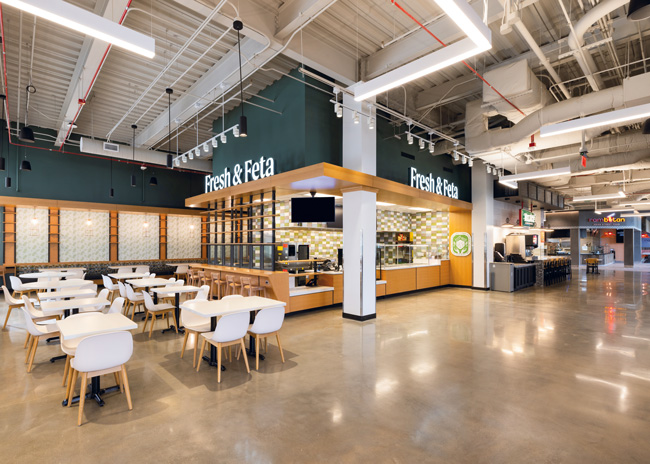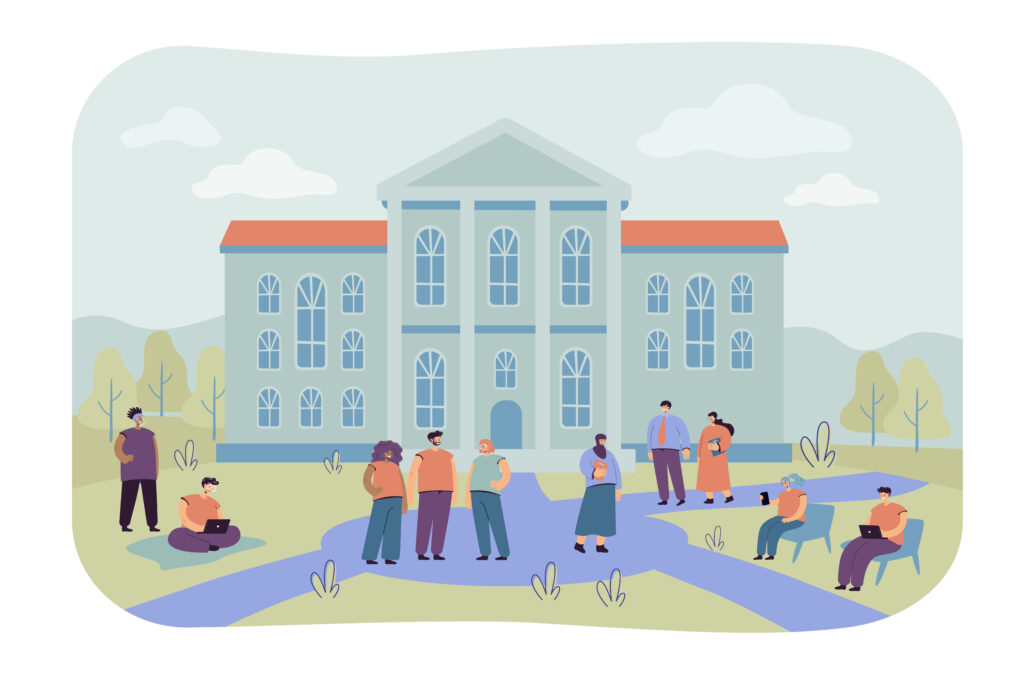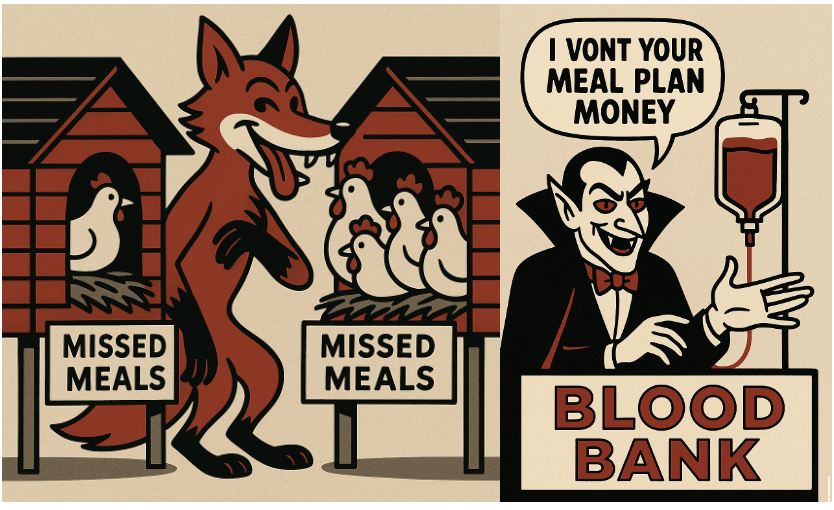
The Social Architect Digest is a thought-provoking, digital blog authored by H. David Porter, a trailblazing visionary with over five decades of experience in strategic planning, campus design, and innovative food service operations. As President and CEO of Porter Khouw Consulting, Inc., David has redefined the college and university dining experience throughout his career pioneering the concept of SOCIAL ARCHITECTURE™. This holistic approach merges design, community-building, social interaction, and strategic foresight to create transformative campus environments.
This weekly blog delivers expert insights and ideas for university administrators, food service professionals, and architects striving to craft Next Generation Residential and Retail Dining Programs. This blog bridges the gap between visionary strategy and real-world application. Drawing exclusively from David’s extensive experience and knowledge of consulting for college and university dining programs since 1990, in addition to 19 years of hands-on operations and management experiences that all began at the iconic Pillar House fine dining restaurant (circa 1971-1979) and including Harvard University in the late 80s.
MICRO BLUE ZONES: Reimagining Campus Dining as the Epicenter of Lifelong Health, Belonging, and Academic Success
What if your campus dining program could do more than just serve food? At Porter Khouw Consulting, we believe it can and should. Our Micro Blue Zones model reimagines dining as the social and emotional heartbeat of campus life. Inspired by the longevity principles of the world’s healthiest communities, Micro Blue Zones turn dining halls into hubs of connection, well-being, and student success. It’s not just about meals, it’s about building lifelong habits, friendships, and a sense of belonging from day one.
Isolation Kills: Why Colleges Must Turn Dining Into a Cure with SOCIAL ARCHITECTURE™
Research shows that the first six weeks of college, what we call the “First 45 Days,” are a make-or-break window for a student’s future. It’s during this period that students form their first connections… or don’t, and the difference can determine whether they thrive, transfer, or drop out.
SOCIAL ARCHITECTURE™, a model that transforms dining from a transactional service into a catalyst for community. Inspired by the science of Blue Zones and decades of behavioral research, SOCIAL ARCHITECTURE™ is designed to fight the epidemic of student loneliness by making dining halls the heartbeat of campus culture. The result? Better retention, improved wellness, and students who don’t just survive college, but thrive in it.
The Evolution of Retail Design: Lessons from Perry Place at Virginia Tech
At Virginia Tech’s Perry Place, retail design becomes more than aesthetics; it becomes storytelling, transparency, and a reflection of student identity. In this piece, David Porter distills decades of experience into a powerful case study that reveals how immersive, student-informed design transforms dining from a transactional necessity into a destination. From all-day breakfast diners born from student requests, to visible smokers and wok ranges that double as theater, Perry Place exemplifies the shift toward emotionally resonant, operationally agile spaces that foster community. The lesson is clear: design with your audience, not for them.
“Gen Z Won’t Tolerate Being ‘Othered’ by Your Menu”
Gen Z won’t settle for just menu choices, they want to be seen, heard, and valued. From cultural representation to sustainability and ingredient transparency, today’s students are demanding more than food, they’re demanding belonging.
In this compelling new blog, David Porter, drawing on the expertise of Sid Mehta, reveals how subtle forms of “othering” in campus dining programs are eroding trust, engagement, and retention. And why, in an era where identity and inclusion matter more than ever, ignoring these signals could cost your institution far more than a few meal swipes.
Discover how SOCIAL ARCHITECTURE™ can help transform dining from a transactional experience into a powerful engine of community, empathy, and emotional well-being.
Don’t just serve Gen Z. Invite them to the table and let them shape it.
What You Really Learn at MIT and Why Next-Gen Dining Matters More Than Ever
In this week’s blog, David dives into a powerful truth echoed by Peter Diamandis: the real ROI of college isn’t just what you learn, it’s who you meet, how you think, and the community you build. Drawing from decades of experience in higher ed strategy, David unpacks the idea that dining spaces, when designed through the lens of SOCIAL ARCHITECTURE™, can be some of the most transformative places on campus. It’s not just about meals; it’s about moments that spark lifelong connections. Don’t miss this look at how campuses can unlock the hidden curriculum through intentional social design.
The Meal Plan Revolution: Why Students Aren’t the Problem—Your Program Is.
Why are students ditching meal plans in droves, even after parents invest in the biggest options? The answer might not be what you think. Drawing from over five decades of food service experience, including Harvard dining operations and more than 400 campus consulting projects, David Porter reveals the truth behind declining participation: it’s not about the price, it’s about the program.
In this blog, discover how “The Inferior Program Penalty” and outdated assumptions are crippling campus dining—and how rethinking your approach through value-driven, student-centered design can turn your meal plan from a burden into a magnet. Learn why students will pay more when a program works for them. and how SOCIAL ARCHITECTURE™ is the key to transformation.
A Bowl of Tomato Soup & a Grilled Cheese Sandwich – Drop the Mic
What if the key to student success isn’t in the classroom, but in the dining hall?
In A Bowl of Tomato Soup & a Grilled Cheese Sandwich – Drop the Mic, David Porter makes a compelling case for reimagining campus dining as the emotional and social heart of college life. Through the humble lens of comfort food—tomato soup and grilled cheese—Porter explores how simple, nostalgic meals can foster connection, ease loneliness, and become powerful tools for student retention and well-being. This isn’t just about food—it’s about creating spaces that invite students to stay, share, and belong. Hungry for a better campus experience? Start with soup.
Is That Too Much to Ask? Why Every College Dining Hall Should Offer French Fries, Mac ‘n Cheese, Great Burgers, Grilled Subs, Plant-Forward Options and Allergen-Free Choices—Every Single Day
Is it too much to ask for consistent, craveable, inclusive food options every single day, especially when I’m paying between $5,000 and $9,000 a year for a mandatory meal plan?
In his latest blog, David challenges colleges to rethink what students really want from their dining experience. Spoiler alert: it’s not complicated, it’s consistent, craveable, inclusive food that shows up daily and delivers on the value of a dining program that is worth paying $5K+ for a mandatory meal plan. It’s time to stop making excuses and start forming social ecosystems and friendship networks.
Milkshake for Breakfast: Why It’s Time to Rethink the Rules of Dining on Campus
There’s something delightfully rebellious—almost poetic—about the idea of having a milkshake for breakfast—a small act that flips outdated campus dining norms on their head. In “Milkshake for Breakfast,” David Porter, FCSI, challenges institutions to reimagine the dining experience as a vital tool for student well-being, not just a schedule-driven service. He argues that giving students the freedom to choose—from tofu scrambles to protein-packed shakes—creates more than just meal variety; it fosters community, independence, and a sense of belonging. With his SOCIAL ARCHITECTURE™ approach, Porter makes a compelling case: the path to student connection might just begin with breakfast—and a milkshake.
How to Eliminate “The Inferior Program Penalty” and Restore the Full Value and Appeal of Your Dining Program and Meal Plans for Your Students
When students are forced to buy a meal plan they don’t value, they pay twice—once to the school, then again to DoorDash. We call this The Inferior Program Penalty, and it’s costing colleges more than just revenue—it’s hurting satisfaction, retention, and campus life. David explains how PKC helps schools eliminate this penalty by designing dining programs that offer real value: convenience, variety, flexibility, and relevance. Is your campus paying the price? Let’s fix that.
The Freshman Fallacy: The Myth That’s Undermining Campus Dining
The claim that residential dining becomes monotonous after a few weeks is a myth—one often used to justify cutting menus, shrinking hours, and shifting students to retail outlets. But students aren’t tired of dining halls; they’re tired of uninspired design. When dining is built around connection, care, and community—not just convenience—it becomes the heartbeat of campus life, not a burden to escape.
The Ultimate Outcome of a College Education: Can Next-Gen Residential & Retail Campus Dining Foster Human Connections, Belonging and Lifelong Success?
Think campus dining is just about food? Think again. In David’s latest blog, he reveals how dining programs, when intentionally designed, can become one of the most powerful tools in higher education. Rooted in the concept of SOCIAL ARCHITECTURE™, this piece explores how shared meals foster belief, belonging, and the deep connections that drive student retention, well-being, and even career success.
Food, Feelings, and Futures: The Power of Comfort Food in Campus Dining
What if one of the biggest secrets to student happiness—and retention is staring us in the face? In this joyful and data-backed blog, David Porter shares why good comfort food is more than a necessity, it’s a strategic pillar and cornerstone of the student experience. From mac & cheese, fresh baked rolls w butter, roasted potatoes, chicken tenders, mozzarella sticks and Belgium waffles topped with vanilla ice cream, Porter explains how craveable comfort food and well-designed dining spaces foster and amplify emotional connections, boost mental health and emotional security, and turns the freshman fifteen into making fifteen new friends not gaining fifteen new pounds. This isn’t just about flavor—it’s about feelings, memories, and human connections. And human connection(s) create positive results.
From Isolation to Integration: Reimagining the Campus for Human Connection
Today’s students are more disconnected than ever—and it’s not just a side effect of the pandemic. It’s a generational shift. In this timely and thought-provoking blog, David Porter explores how intentional campus design—what we call SOCIAL ARCHITECTURE™—can rebuild the sense of belonging students desperately need.
From reimagined dining spaces to smarter programming for first-year students, discover how colleges and universities can create environments that foster real human connection, improve retention, and spark lifelong memories.
Flourishing in the Face of Chaos: How Strategic Dining Investments Can Drive Student Success During Economic Uncertainty
In a time of frozen funding, hiring freezes, and escalating student expectations, colleges and universities are under immense pressure to do more with less. But amidst the chaos, a surprising hero emerges: your campus dining program. David breaks down how strategic investments in dining—not cuts—can drive retention, boost auxiliary revenue, and create the kind of community today’s students crave. Discover how campuses are turning food service into a competitive advantage and why connection, not just calories, could be the key to thriving in uncertain times.
Rethinking the RFP- Why it’s Time for Colleges to Take Back Control of Their Dining Programs
In his session at NACAS South 2025, David Porter challenged higher education leaders to rethink food service RFPs. He argued that universities should define their dining programs, not contractors, whose goals prioritize profit over student engagement. Highlighting Porter Khouw Consulting’s approach, he emphasized creating value through student-focused dining experiences and a transparent, fair RFP process. Check out this blog, where he expands on the session’s key insights which urged institutions to take control of their food service strategy and transform student life through dining.
Why is it That the Harder I Work, the Luckier I Get?
What if “luck” isn’t luck at all—but the natural result of relentless effort, bold vision, and deep human connection? In this powerful reflection, H. David Porter shares how decades of strategic work in campus dining have reshaped student experiences nationwide. From the birth of SOCIAL ARCHITECTURE™ – NEXT GEN ANYTIME DINING to a mission that’s transforming lives, this piece is a blueprint for building your own “luck”—one purposeful step at a time.
SOCIAL ARCHITECTURE™ and the Student Social Biome: How Next-Gen Dining and Intentional Campus Design Fuel Connection, Belonging, and Success
Student success isn’t just about academics—it’s about connection. A thriving Student Social Biome is built through daily interactions in residence halls, dining spaces, and common areas. Enter SOCIAL ARCHITECTURE™—a strategic approach to designing campuses that foster meaningful relationships. When paired with Next-Gen Dining, which transforms meals into social experiences, this approach strengthens student well-being, retention, and success. From communal tables to late-night breakfast socials, intentional design fuels belonging. The question isn’t whether your campus has a Social Biome—it’s whether you’re cultivating it for student success.
Creating a Culture of Connection: How SOCIAL ARCHITECTURE™ & Next Gen Dining Build Holistic Student Well-Being
College dining should be more than just meals—it should be a hub for connection and belonging. At Porter Khouw Consulting, our SOCIAL ARCHITECTURE™ approach transforms dining into a powerful tool for student well-being, fostering friendships, resilience, and engagement.The First 45 Days are critical for student retention. Our Next Gen Dining Programs create intentional experiences—small-group meals, cultural storytelling, and community events—that help students find their place.
When dining is designed with purpose, it drives success. Let’s reimagine campus dining together.
Telling Your Own Story: The Strategic Power of Social Architecture™ in Dining Programs
If you don’t tell your story, someone else will—and they won’t get it right. Campus dining programs offer immense value, yet too often, their impact goes unnoticed. Through SOCIAL ARCHITECTURE™, dining can become more than just a meal—it can be a platform for connection, culture, and student success. From engaging staff as storytellers to leveraging student voices and showcasing the real value of meal plans, strategic storytelling is essential. By crafting authentic narratives, dining programs can increase engagement, drive participation, and reshape perceptions.Want to turn your dining program into a story worth telling? Read more to learn how.
Dr. Parnell’s Keynote: “The Joy and Challenge of Student Affairs”: How Next Gen Dining and SOCIAL ARCHITECTURE™ Are Critical to the Future of Higher Ed
If you were at NASPA 2025’s Opening Keynote, you felt it: the tension, the urgency, the hope—and most importantly, the community. Whether you were nodding along with Dr. Amelia Parnell’s deeply personal reflections or digesting the clear-eyed analysis of the state of our profession, one message rang clear: we are in the midst of profound […]
Rate My Freshman Experience: The Porter Index—How to Choose a College and Get the Life You Want
Selecting a college goes beyond academics and rankings—it’s about finding a community where you can thrive. RateMyFreshmanExperience.com offers real student insights into campus life, social dynamics, and support systems, helping prospective students make informed decisions. Through authentic reviews and comprehensive overviews, this platform empowers students to choose a college that aligns with their personal and social needs
The Power of SOCIAL ARCHITECTURE™: A Blueprint for Student Affairs, Anxiety to Empathy—Transforming Campus Dining into a Catalyst for Student Success
With more students commuting, seeking off-campus dining options, or feeling disconnected from their institutions, colleges and universities must reimagine how they structure the student experience. The first six weeks of a student’s college journey are critical—if they don’t form strong connections, they are far more likely to leave. Dining, as the most frequented campus space, offers the greatest opportunity to foster engagement and retention.
Can Next Gen Dining & SOCIAL ARCHITECTURE™ Reduce Anxiety and Help Restore Mental Health in College Students?
Nicholas Kristof has argued that if we want to address the mental health crisis among college students, we need to go beyond band-aid solutions. We need to reimagine the college experience as one centered around human connection.¹ This means designing campuses that prioritize communal spaces, investing in dining programs that bring students together, and recognizing that the most important education students receive may not be in the lecture halls, but in the moments they share with one another over meals, coffee, and conversation.
Can Next-Gen Dining Save Higher Ed? A Holistic Approach to Mental Health and Retention
Higher education faces declining enrollment and rising mental health challenges. The key to retention may be hiding in plain sight—dining. Dining is one of the few universal student touchpoints. When designed intentionally, it fosters social connections, emotional well-being, and academic success. Research shows that friendships formed in the first six weeks of college predict long-term retention. Next-gen dining reimagines meal programs as hubs for interaction, transforming them from transactional spaces into community anchors. By investing in dining as a social infrastructure, colleges can boost retention, engagement, and student success—one meal at a time.
Can My Self-Operated Dining Program Enjoy the Purchasing Power, Volume Discounts, and Rebates of a Global Food Service Organization?
Many colleges assume self-operated dining means sacrificing the bulk discounts, rebates, and cost efficiencies enjoyed by large food service providers. But is that really the case? In our latest blog, we break down how self-op programs can leverage Group Purchasing Organizations (GPOs), direct supplier negotiations, and strategic procurement models to close the pricing gap—without giving up operational control.
The Porter 10X Self-Op Pledge: Transforming Campus Dining with Strategy and Success
Should your campus self-operate its dining program or contract with a food service provider? While self-op offers flexibility and control, it demands strong leadership, financial planning, and operational discipline. At Porter Khouw Consulting, we’ve developed The Porter 10X Self-Op Promises—a framework ensuring self-op dining thrives, not just survives. In this blog, we outline the essential commitments every self-op institution must make for success.
Can Menu Engineering and Prime Cost Optimization Eliminate Subsidized Campus Dining?
Many colleges and universities struggle to keep retail à la carte food service locations financially sustainable. With high food costs, excessive labor expenses, and price-sensitive students, many institutions are forced to subsidize their dining operations, sometimes by hundreds of thousands of dollars annually. Two critical tools—Menu Engineering and Prime Cost Optimization—offer a way to eliminate […]
The Hidden Cost Spiral: Food and Labor Expenses in Management Fee Contracts
This blog uncovers the hidden pitfalls of management fee contracts in campus dining and why they often lead to skyrocketing food costs. It reveals how providers, with no financial risk, lack the incentive to control spending
—leading to inefficiencies, inflated pricing, and excessive waste. More importantly, it explores strategic contract shifts that can hold providers accountable, ensuring cost efficiency and financial sustainability for institutions.
The Variety Paradox: Why Predictable Menus in College Dining Halls Lead to Greater Satisfaction
This paradox challenges traditional dining hall strategies and highlights the value of stability in food offerings. Instead of overwhelming students with choices, a dependable menu that includes the most popular and familiar items creates a sense of reliability and comfort. This article explores the Variety Paradox and its implications for designing dining programs that truly satisfy student needs.
Recruit and Retain More Students and Alumni, Save Millions on Dining, and Stop Letting the Food Service Contractors Eat Your Lunch
If your institution is facing declining enrollment, low student satisfaction with meal plans, and rising costs from food service contractors, it’s time to rethink your approach. The good news? By adopting a strategic, student-focused dining program rooted in SOCIAL ARCHITECTURE™, you can recruit and retain more students, build long-lasting alumni connections, and achieve significant financial savings.
Designing the Heart of Campus Life: A Strategic Food Hall Blueprint
A great campus food hall is more than just a place to eat—it’s a hub for connection and well-being. At PKC Design Studio, our blueprint balances operational efficiency with an exceptional dining experience. By combining data-driven design, smart space planning, and SOCIAL ARCHITECTURE™, we create vibrant, future-ready spaces that foster student engagement and success. Stay tuned to discover how strategic food hall design transforms campus life.
The Enrollment Cliff and Retention Crisis: A Dual Challenge for Higher Ed
With the enrollment cliff and retention crisis looming, colleges face a key question: focus on recruiting new students or retaining current ones? The answer lies in balance. A holistic approach—combining recruitment with student success efforts—is essential. Retention initiatives like first-year support and affordability not only keep students enrolled but also enhance an institution’s appeal. Stay tuned as we explore strategies to future-proof campuses.
Is The Era of Traditional All-You-Care-To-Eat Dining Over?
This blog explores the shift from the traditional “all-you-care-to-eat” dining model to the more flexible and student-centered “Anytime Dining.” As campus dining evolves, this new approach prioritizes convenience, sustainability, and community, addressing concerns like food waste and meal plan dissatisfaction while fostering stronger social connections and improving student retention.
Unlocking the Power of Next-Generation Dining Programs: A Strategic Blueprint for Retention and Housing Success
When colleges and universities grapple with retention issues and declining housing occupancy, the immediate response is often to address financial aid, academic challenges, or mental health services. But there’s a silent, systemic issue hiding in plain sight that can have an equally devastating impact on retention and housing success: the campus dining program.
Self-Operated vs. Contracted Food Services: The Wrong Question?
This blog explores why reframing the conversation and focusing on strategy first, colleges and universities can transform their dining programs from transactional services into transformative tools for campus success.
The Hidden Cost of the Race to the Bottom in Campus Dining: A Case for Value-Driven Strategies
This blog explores why lowering meal plan prices is a short-sighted approach and how institutions can adopt a value-driven strategy that transforms dining programs into powerful tools for student engagement, retention, and success.






































